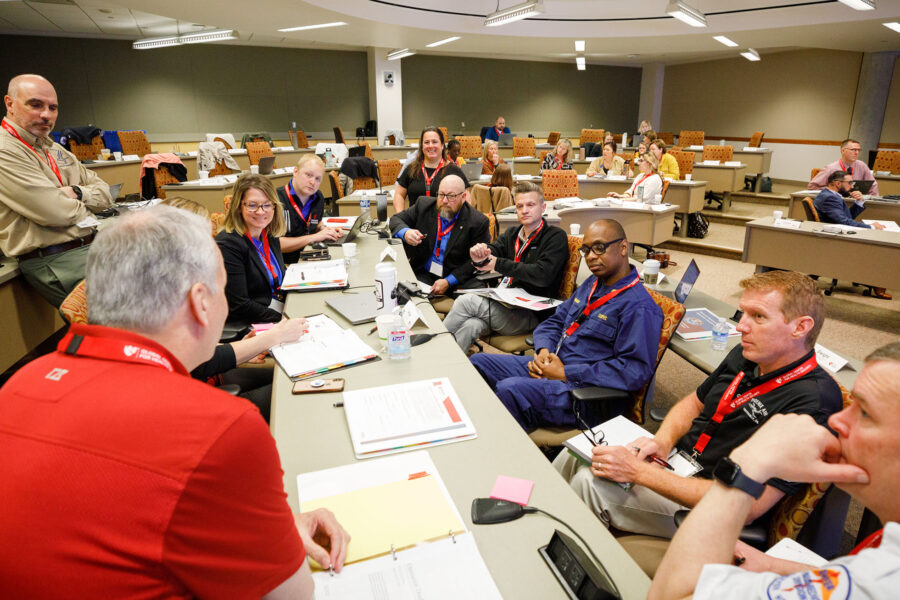A team of emergency responders, physicians, nurses, government personnel and international colleagues tested the readiness of the National Quarantine Unit last month, led by the Global Center for Health Security at UNMC and Nebraska Medicine.
As the only federally designated quarantine unit, the NQU must be capable and ready to activate on a moment’s notice. It is not only required by federal contract, but also it’s essential to ensure a prompt, effective response on the frontlines of defense during an emerging special pathogen outbreak, bioterrorism attack or other public health emergency.
The three-day exercise held at UNMC’s Sorrell Center provided two days of table-top exercises guided by facilitator Michael Hartley, a retired emergency manager from Iowa. The exercises allowed participants to examine escalating scenarios and gather in groups to learn from one another, while identifying, exploring and proposing solutions for potential issues they discovered.
The third day consisted of a functional exercise focused on the process of coordinating key agencies to activate the National Quarantine Unit.
Dwight Ferguson, PhD, regional emergency coordinator for the Administration for Strategic Preparedness and Response within the U.S. Department of Health and Human Services, said, “When it comes to preparedness plans, they must be tested.”
He said these exercises help the agency’s state partners prepare for unexpected situations, build familiarity through collaboration and, ultimately, enhance professional relationships to better assist, understand and overcome the challenges they face.
Dr. Ferguson praised Nebraska Medicine and UNMC’s proven expertise at preparedness and response. “It is a pleasure to work with Nebraska Medicine and UNMC, whose missions align so closely with ours,” he said. “To have such partners in our region to help meet the needs of the nation, and perhaps beyond the nation, are assets we value.”
Joe Lamana, director of the Office of International Operations at the Administration for Strategic Preparedness and Response, attended the exercise and referred to the NQU as “a national asset.” He said these annual exercises are essential to ensuring functionality, effectiveness and efficiency — given the breadth of need for preparedness, there is a duty to invest wisely in high-need areas like isolation care and biocontainment transport.
A persistent problem faced after every crisis is “post-disaster amnesia syndrome.”
“Once the disaster ends,” Lamana said, “everybody forgets about it; it will be forgotten unless it is institutionalized.”
The lessons learned during a disaster response must be identified and their solutions implemented to avoid repeatedly overcoming the same, or a similar, challenge. “Coordinating and working towards a common goal is the key to success,” Lamana said. Responders at local, state and federal agencies must be able to openly communicate and easily share information — a skill tested and put into practice during the three-day exercise.
In conjunction with the National Emerging Special Pathogens Training and Education Center, the Nebraska Biocontainment Unit at Nebraska Medicine also conducted a drill to validate the protocols for transporting a patient from the quarantine unit to the biocontainment unit via two different routes of entry into the hospital.
The drill provided an opportunity to demonstrate key protocols to the NETEC consultation team. It allowed staff to exercise the use of bone conduction headphones that improve communications while users are wearing a powered air purifying respirator. It also reinforced the high level of preparedness the Nebraska Biocontainment Unit maintains as the Region VII Regional Emerging Special Pathogens Treatment Center.
Angela Vasa, Nebraska Medicine’s director of isolation and quarantine, said, “The NQU exercise is a prime example of how local response capabilities are crucial national preparedness. This exercise provided an opportunity to engage local, state and federal partners to test plans and to ultimately improve coordination for the next crisis. It is these types of preparedness exercises that lead to better response in real-world events.”
